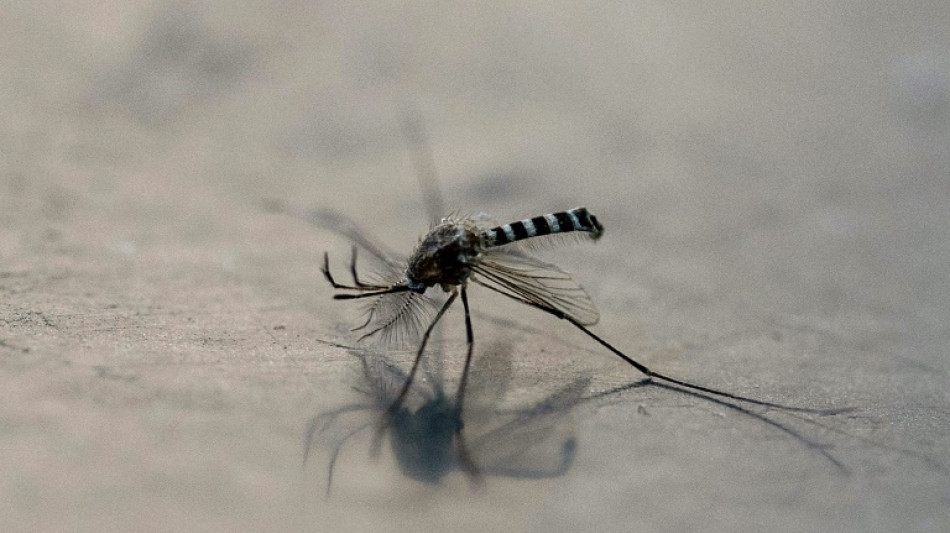
-
 Sudan's El-Fasher under the RSF, destroyed and 'full of bodies'
Sudan's El-Fasher under the RSF, destroyed and 'full of bodies'
-
From farms to court, climate-hit communities take on big polluters

-
 Liverpool have 'moved on' from Salah furore, says upbeat Slot
Liverpool have 'moved on' from Salah furore, says upbeat Slot
-
Norway crown princess likely to undergo lung transplant

-
 Iraq negotiates new coalition under US pressure
Iraq negotiates new coalition under US pressure
-
France's budget hits snag in setback for embattled PM

-
 Putin hails Ukraine gains, threatens more, in annual press conference
Putin hails Ukraine gains, threatens more, in annual press conference
-
US suspends green card lottery after Brown, MIT professor shootings

-
 Chelsea's Maresca says Man City link '100 percent' speculation
Chelsea's Maresca says Man City link '100 percent' speculation
-
Dominant Head moves into Bradman territory with fourth Adelaide ton

-
 Arsenal battle to stay top of Christmas charts
Arsenal battle to stay top of Christmas charts
-
Mexican low-cost airlines Volaris and Viva agree to merger

-
 Border casinos caught in Thailand-Cambodia crossfire
Border casinos caught in Thailand-Cambodia crossfire
-
Australia's Head slams unbeaten 142 to crush England's Ashes hopes

-
 Epstein files due as US confronts long-delayed reckoning
Epstein files due as US confronts long-delayed reckoning
-
'Not our enemy': Rush to rearm sparks backlash in east Germany

-
 West Indies 110-0, trail by 465, after Conway's epic 227 for New Zealand
West Indies 110-0, trail by 465, after Conway's epic 227 for New Zealand
-
Arsonists target Bangladesh newspapers after student leader's death

-
 Volatile Oracle shares a proxy for Wall Street's AI jitters
Volatile Oracle shares a proxy for Wall Street's AI jitters
-
Tears at tribute to firefighter killed in Hong Kong blaze

-
 Seahawks edge Rams in overtime thriller to seize NFC lead
Seahawks edge Rams in overtime thriller to seize NFC lead
-
Teenager Flagg leads Mavericks to upset of Pistons

-
 Australia's Head fires quickfire 68 as England's Ashes hopes fade
Australia's Head fires quickfire 68 as England's Ashes hopes fade
-
Japan hikes interest rates to 30-year-high

-
 Brazil's top court strikes down law blocking Indigenous land claims
Brazil's top court strikes down law blocking Indigenous land claims
-
Conway falls for 227 as New Zealand pass 500 in West Indies Test

-
 'We are ghosts': Britain's migrant night workers
'We are ghosts': Britain's migrant night workers
-
Asian markets rise as US inflation eases, Micron soothes tech fears

-
 Giant lanterns light up Christmas in Catholic Philippines
Giant lanterns light up Christmas in Catholic Philippines
-
TikTok: key things to know

-
 Putin, emboldened by Ukraine gains, to hold annual presser
Putin, emboldened by Ukraine gains, to hold annual presser
-
Deportation fears spur US migrants to entrust guardianship of their children

-
 Upstart gangsters shake Japan's yakuza
Upstart gangsters shake Japan's yakuza
-
Trump signs $900 bn defense policy bill into law

-
 Stokes's 83 gives England hope as Australia lead by 102 in 3rd Test
Stokes's 83 gives England hope as Australia lead by 102 in 3rd Test
-
Go long: the rise and rise of the NFL field goal

-
 Australia announces gun buyback, day of 'reflection' after Bondi shooting
Australia announces gun buyback, day of 'reflection' after Bondi shooting
-
New Zealand Cricket chief quits after split over new T20 league

-
 England all out for 286, trail Australia by 85 in 3rd Test
England all out for 286, trail Australia by 85 in 3rd Test
-
Australian announces gun buyback, day of 'reflection' after Bondi shooting

-
 Joshua takes huge weight advantage into Paul fight
Joshua takes huge weight advantage into Paul fight
-
TikTok signs joint venture deal to end US ban threat

-
 Conway's glorious 200 powers New Zealand to 424-3 against West Indies
Conway's glorious 200 powers New Zealand to 424-3 against West Indies
-
Barnwell Industries, Inc. Reports Results for Its Fourth Quarter and Year Ended September 30, 2025

-
 What is the Best Scar Removal Cream for C-section?
What is the Best Scar Removal Cream for C-section?
-
Agronomics Limited Announces Dissolution of Meatable

-
 Agronomics Limited Announces Liberation Bioindustries Series A1 Equity Round
Agronomics Limited Announces Liberation Bioindustries Series A1 Equity Round
-
The European "Anti-Trend" Has Arrived

-
 LEXINOVA Trading Center Releases New Brand Positioning Strategy Focused on Global Compliance and Institutional-Grade Infrastructure
LEXINOVA Trading Center Releases New Brand Positioning Strategy Focused on Global Compliance and Institutional-Grade Infrastructure
-
Guardian Metal Resources PLC Announces Pilot Mountain Pre-Feasibility Progress Update


Mosquitoes with 'toxic' semen could stem disease spread: research
Genetically engineered mosquitoes with toxic semen could be a new weapon against tropical disease, Australian scientists said after trialling the novel pest control method.
The "toxic male technique" aims to breed mosquitoes that express venomous proteins in their semen, killing off females after mating.
Female mosquitoes are targeted because only they bite and drink blood, thereby spreading diseases such as malaria and dengue fever.
Scientist Sam Beach from Australia's Macquarie University said the method "could work as quickly as pesticides without also harming beneficial species".
"This innovative solution could transform how we manage pests, offering hope for healthier communities and a more sustainable future."
The first proof-of-concept trials used fruit flies, a common laboratory species favoured for its short two-week life cycle.
Female flies that bred with "toxic" males had a significantly reduced lifespan, the scientists found.
Researcher Maciej Maselko said the team would now trial the method in mosquitoes.
"We still need to implement it in mosquitoes and conduct rigorous safety testing to ensure there are no risks to humans or other non-target species," he said.
Genetic engineering has been used for years to control populations of disease-spreading mosquitoes.
Typically, these approaches slow reproduction by releasing hordes of male insects that are genetically modified to be sterile.
Computer models showed techniques actively killing biting females could be far more effective, the research team said.
The research was described in a paper published by peer-reviewed journal Nature Communications on Tuesday evening.
L.Durand--AMWN


